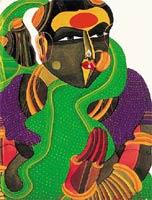Mirror, mirror on the wall, can you spot the not? On the right you have a 16"x20" oil on canvas by Paritosh Sen; on the left another that's identical; both have the artist's signature. The price? The one on the right commands Rs 1.5 lakh; the one on the left has a tag that reads Rs 7,000. No, it's not a heinous rip-off but one of India Fine Art's 50 limited edition reproductions on canvas, true to size and signed.
 Manvinder Dawer, a Mumbai-based art promoter and now the proprietor of India Fine Art, has Hyderabad artist Laxma Goud to thank for supporting his initial efforts. "One-and-a-half years later, I have 27 handpicked artists to offer in limited edition prints."
Manvinder Dawer, a Mumbai-based art promoter and now the proprietor of India Fine Art, has Hyderabad artist Laxma Goud to thank for supporting his initial efforts. "One-and-a-half years later, I have 27 handpicked artists to offer in limited edition prints."
Dawer is just one of very few delivering a scarce commodity in a highly under-explored segment. Art Today, now shut, was among the first to produce signed and numbered prints in order to, as it said then, 'extend the hanging value of contemporary works to many more interiors where art will be enjoyed beyond the price-tag.'
For a few years now, Pundole Art Gallery in Mumbai has been selling manually reproduced, limited-edition serigraphs, lithographs and etchings.
"This kind of reproduction excites me more because, with the cleaning and inking of the plate each time, there is a creative intervention at every stage. Also, each print varies slightly, making it almost exclusive from the others."
Pundole also sells cheaper poster prints, but these are not signed and are in no way limited. Says Dadiba Pundole, proprietor of the gallery, "The only advantage of keeping it limited is to enhance the perceived value of the reproduction."
That's why what Dawer is doing is twice as smart. He ensures the buyer gets both aesthetic value by ensuring the best print quality that is possible, and perceived monetary merit, both by making reproductions limited and by getting the artist to sign each print.
Dawer is now extending his efforts to artwork merchandising. When clearing the quality of Khanna's reproductions, he noticed the artist's sketchbook.
"I suggested reproducing the sketchbook as is, with the same drawings in the same order as the original." One hundred editions, each with 43 sketches, individually signed by Khanna, were reproduced. "Each of those sketches sold at Rs 70,000 at the Krishen Khanna retrospective earlier this month."
But it's not always easy to get artists to see the merit in reproductions. Popular artist Sunil Padwal reacts, "Only when I am 80 years old and commanding Rs 40 lakh per canvas and producing only a few pieces a year, would I consider reaching out en masse through prints." Dawer laughs off the hesitation of younger artists, saying, "Prints can never encroach on an artist's value; it attracts an entirely different buyer profile."
Yet, business isn't as brisk as it should or could be. "It is the business of the future; I am looking at it as a five-year plan because the market has to grow," says Dawer.
Meanwhile, there are creases to be ironed out, as in the case of printing on canvas, where according to Pundole, the water-based inks used as the cheaper alternative to the transfer method, are only semi-permanent, and there's bound to be loss of quality with time.
But for now, just the fact that more players are emerging to legitimise the market for prints and making it a better value proposition for buyers is a step in the right direction.
So, the next time you are yearning to own a Thota Vaikuntam, just go out and buy one -- a 24"x 36" reproduced canvas, duly signed, will set you back by only Rs 5,000. But since all prints are numbered, and marked as reproductions, don't even try and pass it off to your friends as the original.







